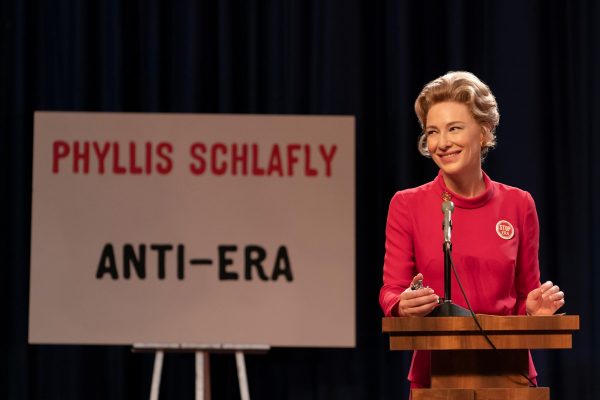Television Review: “Mrs. America” — The Battle Against Equal Rights for Women
By Sarah Osman
Mrs. America is well written and beautifully acted (generally), but its real power stems less from its entertainment value than from how it reveals how little has changed for women since the ’70s.

A scene from Mrs. America featuring Cate Blanchett as Phyllis Schlafly.
It’s not surprising that Mrs. America, an FX miniseries streaming on Hulu, was created by Dahvi Waller, a former writer for Mad Men. Both shows focus on feminism and gender rights during pivotal times in American history, and both explore cultural conflicts that are still very prevalent today. The biggest difference is that Mrs. America’s antihero is a woman, Phyllis Schlafy.
Schlafly was recently teased in the last season of The Marvelous Mrs. Maisel, angrily dismissed as an antifeminist, antigay conservative activist. She continues to be a figure reviled by the left, though Cate Blanchett manages to generate a bit of sympathy for a conservative political operator that many still find loathsome. We first see Blanchett’s Schlafly wearing a patriotic bikini, and the theme of demeaning sexism runs (ironically) throughout a narrative that emphasizes how her husband (John Slattery) ignores the woman’s brilliance. He only cares about her image and that she satisfy his desires (he wants to have sex, she doesn’t, hubby wins out). Congressmen ignore her fight for developing nuclear and missile strategies; during meetings they send her off to fetch a notepad. They only care about what she thinks of the Equal Rights Amendment, or ERA. Mrs. America makes it easy to see how Schlafly ended up fighting so venomously against the ERA; it was the one bit of power that men would give her, though it doesn’t make her crusading any less frustrating. Blanchett shines in this unsympathetic role — you can see what a terrific Hedda Gabler she must have been; you want to rip her to shreds yet can’t help but feel sorry that no one listened to her discuss the ways and means of missiles.
Wisely, the series doesn’t solely focus on Schlafly. Each episode is dedicated to a different player in the ’70s fight for the ERA. Rose Byrne takes on the role of media darling feminist Gloria Steinem, while Uzo Aduba plays Shirley Chisholm, whose run for president was destroyed because of its demands for “progress.” Other key figures include Tracey Ullman as Betty Friedan and Elizabeth Banks as Jill Ruckelshaus, a Republican feminist. Each of the actresses are wonderful in their respective roles. Watching the acidic banter between them makes Mrs. America feel like a ’70s version of The West Wing — you are fascinated by the preparation for and engagement in furious political battle
Unfortunately, Schlafly’s supporters are not as well drawn. Sarah Paulson plays Schlafly’s friend Alice, and it turns out to be a rather dry role. The character isn’t given much dimension, spending a large part of an episode debating whether or not to stay on Team Schlafly. Talented as Paulson is, there simply isn’t much for her to do here. The same goes for Rosemary (Melanie Lynskey), another shrill housewife fighting against passage of the ERA. Perhaps these characters were meant to be out-and-out unlikable — but they have so little depth that they try your patience.
The sets, costumes, and music are nostalgic fun; they take you right back to the funk of the ’70s. We are firmly brought into the pre–Roe v. Wade period; we are darkly reminded of women’s vulnerability in a poignant moment featuring Steinem. Clearly, each episode has been well researched and the director even takes some risks — real-life footage from the era is intermixed with the fictional recreations.
Mrs. America is well written and beautifully acted (generally), but its real power stems less from its entertainment value than from how it reveals how little has changed for women. The series is a stark reminder that women still lack equal rights (the ERA was never passed) and still earn 75 cents to every dollar paid a man. It’s disturbing to think that Roe v. Wade could be taken away in an instant. Antifeminist, antigay women continue to follow Schlafly’s reactionary playbook, combating political and economic progress. There is still the perception (or fear) that America isn’t ready for a female president. Mrs. America was released during an election year, so the series serves as an invaluable reminder of the high stakes of politics. Those in favor of equality for women need to get out and vote this year — or else we might slide back to a world that Schlafly would approve of.
Sarah Mina Osman is a writer living in Los Angeles. She has written for Young Hollywood and High Voltage Magazine. She will be featured in the upcoming anthology Fury: Women’s Lived Experiences under the Trump Era
Tagged: Cate Blanchett, Dahvi Waller, Mrs. America, Phyllis Schlafly
